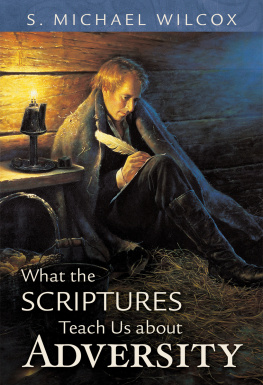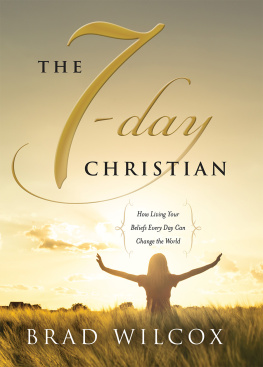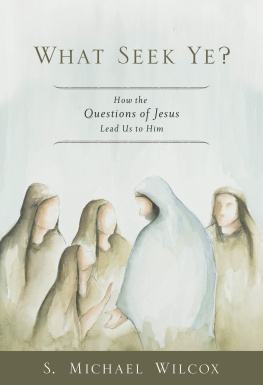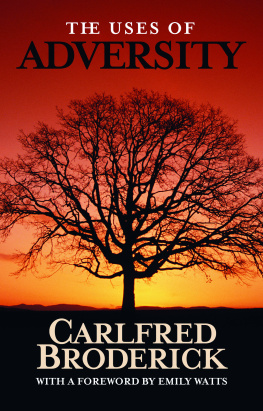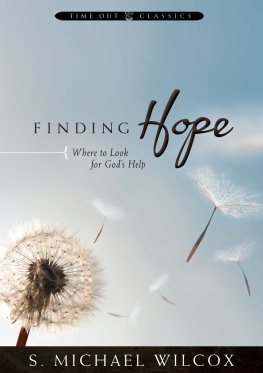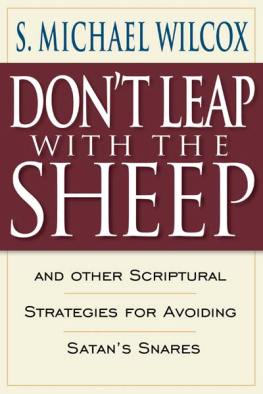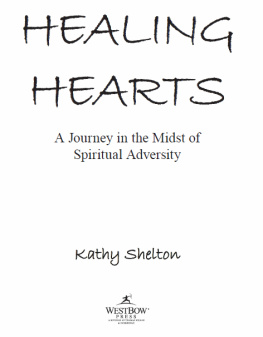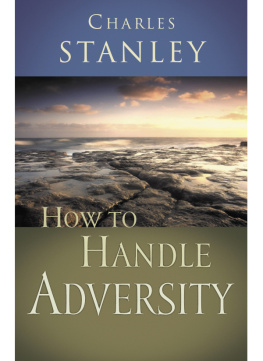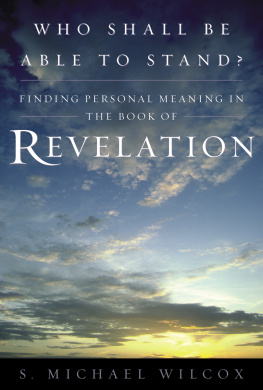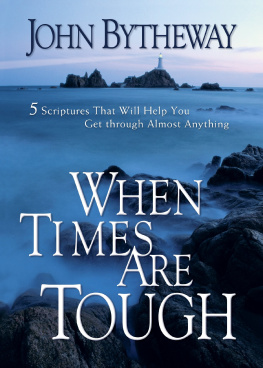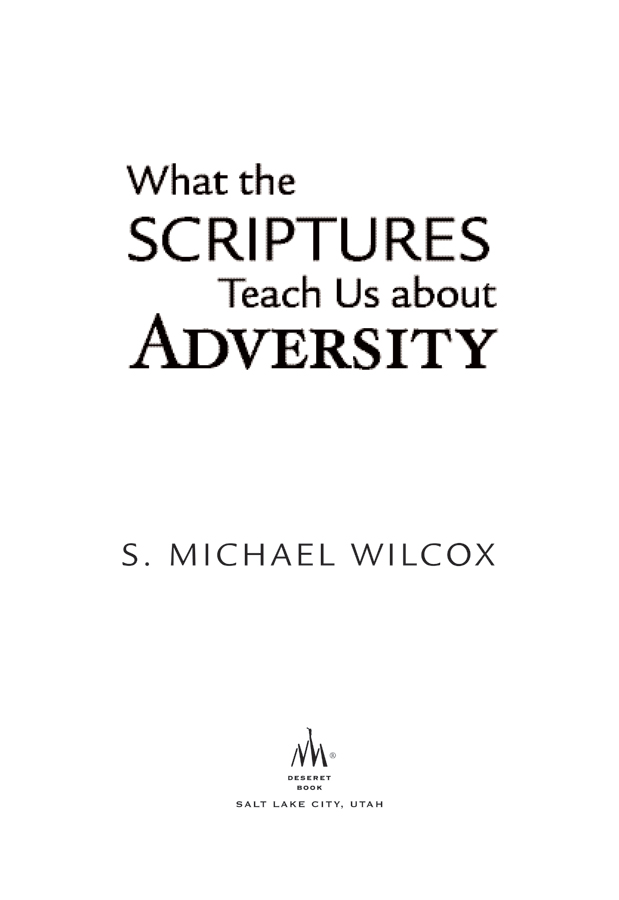2010 S. Michael Wilcox.
All rights reserved. No part of this book may be reproduced in any form or by any means without permission in writing from the publisher, Deseret Book Company, P.O. Box 30178, Salt Lake City Utah 30178. This work is not an official publication of The Church of Jesus Christ of Latter-day Saints. The views expressed herein are the responsibility of the author and do not necessarily represent the position of the Church or of Deseret Book. Deseret Book is a registered trademark of Deseret Book Company.
Libraryof Congress Cataloging-in-Publication Data
Wilcox, S. Michael.
What thescriptures teach us about adversity / S. Michael Wilcox.
p.cm.
Includesbibliographical references and index.
ISBN978-1-60641-811-6 (hardbound : alk. paper) 1. SufferingBiblicalteaching. 2. SufferingReligiousaspectsThe Church of Jesus Christ of Latter-daySaints. 3. The Church of Jesus Christ of Latter-day SaintsDoctrines. I. Title.
BX8643.S93W552010
248.8'6dc22 2010017610
Printed in the United States of America
Worzalla Publishing Co.,Stevens Point, WI
10 9 8 7 6 5 4 3 2 1
May God grant unto you that your burdens may be light,through the joy of his Son.
Alma33:23
Introduction
As for the perils which I amcalled to pass through, they seem but a small thing to me.... Deepwater is what I am wont to swim in. It all has become a second nature to me;...for... the God of my fathers delivered me out of them all, andwill deliver me from henceforth.
JosephSmith, in Doctrine & Covenants 127:2
The Commonality of Adversity
When I was growing up I often heard my grandfather say therewere only two things in life nobody escapeddeath and taxes. Mygrandfather would say this with an ironic half-smile. Now that I amapproaching the age he was when I first heard him utter this piece of folkwisdom, I find that I agree with him. And I would add another inevitability tothe listthat of adversity. Each of us faces trials, setbacks,disappointments, doubts, discouragements, and spiritual droughts. These mayrange from the occasional unaccountable depressions we feel to the tragic,life-shattering, dream-ending episodes that make real ourworst fears.
I did not know when I first wrote this introduction thatwithin a few short months my wife, Laurie, and I would face such a trial.Consistent, perhaps, with the turnings of human destiny, on the day I received the pages of this book for final review, we met with aneurological oncologist, who delivered the news that my beloved Laurie had astage III inoperable malignant tumor in her brain.
We had discovered there were problems after she experienceda series of seizures. When I saw her in the hospital, the only sign that sherecognized me was a smile. I thought at the time, I will never have a conversation with my wife again.All efforts to communicate with her ended in futile despair. Over time theswelling from the seizures subsided, and with the reduction in pressure, hernormal brain functions returned, but our future is certainly not what weenvisioned when I retired to spend more time with her only four monthsbefore.
So we begin our journey into the uncertain and often fearfulworld of adversity. In a brief moment life forever changed. When I first wrotethis book, adversity was primarily theology. Now the principles of thescriptures in which I so ardently believe will be challenged by theuncompromising face of reality. I have reread these pages with such thoughts inmind, and though our time in adversitys shadow has just begun, I find a deepsense of comfort and relief arising from the scriptural truths discovered as Iwrote the following pages. They are proving equal to the crisis of our lives. Ipray they will prove equal to yours.
We are told in sacred places that part of the purpose of ourmortal existence is to face such trials to our faith, to our loves, to the verypossibility of happiness. As difficult as that may be, our trials are part ofthe refining. That may, at times, challenge our belief in Godatleast in a caring, loving, personal Godas well as our beliefin the goodness of others and of mankind in general.
I first tasted grief as a little boy when I witnessed abeloved dog dying behind the generator in the garage at my uncles ranch, whereI stayed during the summer. I learned about cruelty from the bully whoterrorized the very air I breathed and caused me to go to school each daygripped in fear. These initial encounters were mild adversities in the vasthistory of human suffering, but they were mine, and they were the beginning ofmy acquaintance with the common lot of mankind. My refinement now continueswith that single, shattering word: cancer.
Our universal history, both as a species and as individuals,is punctuated by the mystery of human suffering. Because we all must passthrough these experiences, we would be surprised if the scriptures did not giveus counsel, comfort, and preparation for the unavoidable moments we know mustcome but which nonetheless often take us with amazing poignancy. Searching forthat scriptural wisdom is sure to arm us with enduring power and an ability tolearn the lessons that life teaches. Though the scriptures cannot remove thepain we may carry with us for a lifetime, they can help us make sense of thatpain, at least as much as a mortal can understand the often incomprehensible.They can provide a healing hope to which we must ever cling. Because we are allinitiates in the fellowship of pain, the scriptures become our commonbond.
Even a cursory examination of sacred writ reveals humananguish, often on a tremendous scale. Ponder, for example, the cries from thesouls of some of Gods noblest sons and daughters, whose lives were oftenexemplary and whose love of God is undoubted. Rachels grief for her barrennessas she watched her sister bear successive sons to Jacob: Give me children, orelse I die (Genesis 30:1). The pain of her sister, Leah, in an unfulfilled,alienated marriage: Surely the Lord hath looked upon my affliction; nowtherefore my husband will love me (Genesis 29:32). Esaus dawning realizationof lost opportunities: Hast thou not reserved a blessing for me?...Hast thou but one blessing, my father? bless me, even me also, O my father(Genesis 27:36, 38). Davids cry upon hearing of his rebellious sons death inthe battle for his own crown: O my son Absalom, my son, my son Absalom! wouldGod I had died for thee, O Absalom, my son, my son! (2 Samuel 18:33). Elijahpleading for death in the depths of his own discouragement: It is enough; now,O Lord, take away my life; for I am not better than my fathers (1 Kings 19:4).Job sitting upon the ash heap outside his city wishing he had never been born:Let the day perish wherein I was born.... Let that day bedarkness.... For the thing which I greatly feared is come upon me(Job 3:34, 25). Mary and Martha kneeling before the Savior at the deathof Lazarus: Lord, if thou hadst been here, my brother had not died (John11:32). Nephi, deeply aware of his own imperfections, adding to the scripturalrecord: O wretched man that I am! (2 Nephi 4:17). Joseph Smith in LibertyJail, fighting the feeling of abandonment from the Lord he loved, praying: OGod, where art thou? (D&C 121:1). And those simple but heart-rendingwords uttered from the cross by Jesus in the last moments of his life: My God,my God, and I thirst (Mark 15:34; John 19:28).
Where we have no words to express the nature or the depth ofadversity, images are left to us, images that need no words. We see Adam andEve mourning over Cains treachery and over Abel, the victim of his malice;Joseph led by the Ishmaelites into Egyptian slavery as his brothers unfeelinglyignore his pleas; Jeremiah lowered into the darkness and mire of a dungeon inJerusalem. We see Rizpah waving the carrion birds away from the bodies of herexecuted sons. We reflect on the twelve years of anguish endured by the womanwith the issue of blood, the thirty-eight years of the man at thepool of Bethesda, the more than forty years endured by the man lame from birthbegging at the gate Beautiful. We see the physical pain and the spiritualanguish of the lepers and the sinners who came to Jesus for relief. In someway, great or small, almost every story in the scriptures is a record ofstruggle, conflict, and opposition, for those are what mortality brings. Butthere is also triumph, forgiveness, compassion, patience, and endurancemanat his noblest in the face of lifes bewildering inconsistencies and injustice.How do we make sense of it all and still sing with the pure faith of a Primarychild: I know my Father lives and loves me too?

